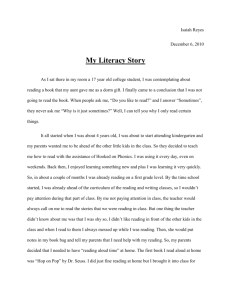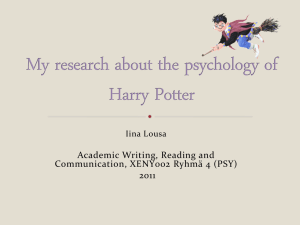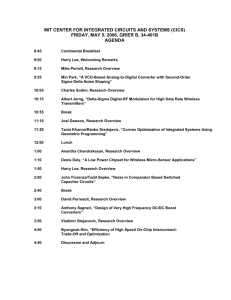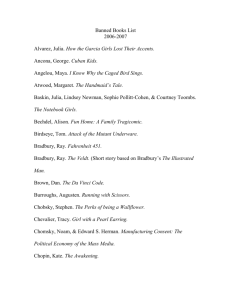Finding Christ in Harry Potter
advertisement
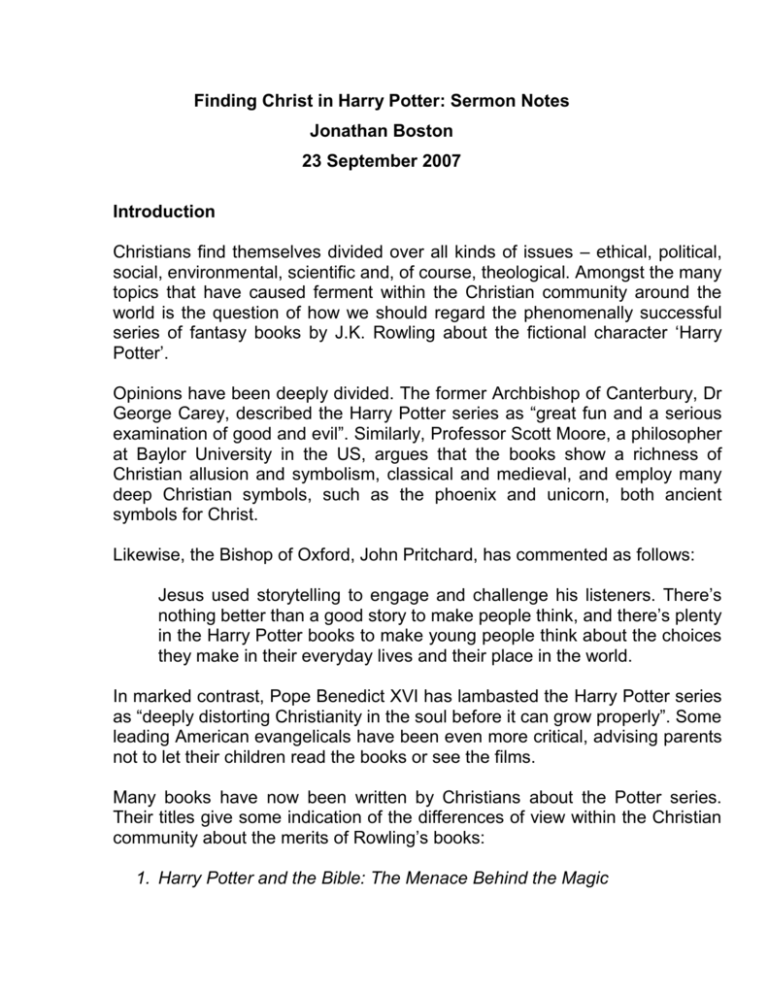
Finding Christ in Harry Potter: Sermon Notes Jonathan Boston 23 September 2007 Introduction Christians find themselves divided over all kinds of issues – ethical, political, social, environmental, scientific and, of course, theological. Amongst the many topics that have caused ferment within the Christian community around the world is the question of how we should regard the phenomenally successful series of fantasy books by J.K. Rowling about the fictional character ‘Harry Potter’. Opinions have been deeply divided. The former Archbishop of Canterbury, Dr George Carey, described the Harry Potter series as “great fun and a serious examination of good and evil”. Similarly, Professor Scott Moore, a philosopher at Baylor University in the US, argues that the books show a richness of Christian allusion and symbolism, classical and medieval, and employ many deep Christian symbols, such as the phoenix and unicorn, both ancient symbols for Christ. Likewise, the Bishop of Oxford, John Pritchard, has commented as follows: Jesus used storytelling to engage and challenge his listeners. There’s nothing better than a good story to make people think, and there’s plenty in the Harry Potter books to make young people think about the choices they make in their everyday lives and their place in the world. In marked contrast, Pope Benedict XVI has lambasted the Harry Potter series as “deeply distorting Christianity in the soul before it can grow properly”. Some leading American evangelicals have been even more critical, advising parents not to let their children read the books or see the films. Many books have now been written by Christians about the Potter series. Their titles give some indication of the differences of view within the Christian community about the merits of Rowling’s books: 1. Harry Potter and the Bible: The Menace Behind the Magic 2. What’s a Christian to do with Harry Potter? 3. Looking for God in Harry Potter 4. The Gospel According to Harry Potter: Spirituality in the Stories of the World’s Most Famous Seeker 5. The Wisdom of Harry Potter: What Our Favorite Hero Teaches Us about Moral Choices The differences amongst Christians over Rowling’s books prompt all kinds of questions: 1. Why have Christians come to such markedly different conclusions about the Harry Potter series? And where does the truth lie – to the extent that this can be discerned? 2. How should we handle differences within the Christian community, especially when such differences expose the church to ridicule within the wider community? 3. What does the response of Christians to the Harry Potter phenomena tell us about the capacity of the church to engage with, contribute to, and intelligently critique, modern culture? Or, to put it differently, what lessons might we learn from the past decade about the extent to which the church is being ‘salt and light’ in the world, and bringing a Christian mind to bear in reflecting on the strengths and weaknesses of contemporary artistic, musical and literary movements? 4. And what does the Potter series tell us about the nature of the world in which we now live – a world of starving millions, wars and ecological disasters in which other millions spend billions on ephemeral paraphernalia, trinkets and trivia. I want to explore a few of these questions over the next few minutes, but first some background remarks about the Harry Potter series. Background How many here have read at least one of the Harry Potter books? Or seen one of the five films? For the record: Mary, I and our children have read all the books and seen the films, and some of us have read several of the books two or more times. I’ve greatly enjoyed them – I’ve found them absorbing, engaging, imaginative, humorous, with often clever, indeed ingenious plots, and some deeply moving 2 passages. They may not become great, enduring works of literature, in the genre of Tolkien, Tolstoy, Shakespeare or Dickens, but they are certainly memorable, and, of course, hugely popular. I gather that over the past decade almost 400 million copies of the books have been sold in nearly 200 countries. The stories have been translated into more than 65 languages. One in four Americans over the age of 12 claims to have seen at least one of the five movies. And J.K. Rowling is said to be worth more than US$1billion. I suspect that most other novelists are deeply envious! Incidentally, if you use the ‘google’ search-engine to find ‘Harry Potter’ you will generate 127 million hits. Admittedly this is 19 million less hits than ‘George Bush’ and 20 million less than ‘Jesus’, but not bad for a person who does not actually exist! For those of you who are not familiar with the Potter series, here’s a quick summary of the background and plot. There are seven books in the series, and they are about a boy called Harry Potter who becomes an orphan when he is barely a year old as a result of the death of his parents. They die at the hands of a sadistic, unloving, immensely powerful, determinedly evil and much feared wizard called Lord Voldemort – also known as the Dark Lord and ‘He who must not be named’. Miraculously, Harry survives this attack, but he is left with a scar on his forehead, which we later learn is a small part of Voldemort’s soul. Harry is subsequently brought up by his unloving aunt and uncle, and discovers, as he gets older, that he has magical powers. When he turns 12 he is offered a place at a famous school for wizards and witches, called Hogwarts, and through this he discovers a whole new, enticing and very different magical world. This world exists, like a parallel universe, alongside the ordinary world of the here and now, but it is invisible to non-magical human beings (who are called muggles). The books tell of Harry’s many and varied adventures over a period of seven years with his two closest friends, Ron and Hermione. Central to these adventures are the repeated efforts of Lord Voldemort and his wicked conspirators to kill Harry. In each book Harry is confronted with the grim reality and power of evil, and suffers deeply, both emotionally and physically. 3 I will not go into the details of what happens in each book – I do not want to spoil it for those who have yet to read them. But, in short, good eventually triumphs over evil and we witness time and again the extraordinary and transforming power of sacrificial love. Indeed, this emphasis on sacrificial or suffering love is, I think, one of the reasons the books have been so popular. But there are many other reasons for their success. These include: The variety, plausibility, humanity and realism of most of the characters and the dilemmas they face; The tragic circumstances surrounding Harry’s life – especially his loss of his parents as a young child; the subsequent loss of his Godfather, Sirius Black, and then his much esteemed Headmaster, Professor Albus Dumbledore; the way he is picked on at school by those envious of his fame or suspicious of his true motives; The David and Goliath nature of the battles between Harry and Voldemort, and the fact that Harry is often alone in these struggles; The importance attached to friendship, loyalty, trust, courage, etc. Why the Controversy? So why all the fuss? The main objections from some Christians are as follows. It is argued that the Harry Potter books legitimize dark magic and the demonic, and are likely to encourage young people to take an active interest in the occult. It is also contended that the books are different to other children’s fantasy stories which contain witches and other magical creatures, such as the Chronicles of Narnia by C.S. Lewis. This is because, or so it is claimed, the Harry Potter books do not present a positive Biblical worldview, they sometimes blur the distinction between good and evil, and they lack any mention of our ultimate answerability to God. Another objection is that the books contain lots of violence, deaths and suffering, and may thus be emotionally disturbing for sensitive young minds. Some Christians have also claimed that the books distort some key Biblical themes and are thus theologically flawed. If these arguments are true, then Christian parents might well wish to think twice before allowing their children to read the books or see the films. After all, the Bible clearly condemns every kind of activity associated with the demonic – witchcraft, sorcery and spiritism (Deuteronomy 18: 10-11). 4 But it is not clear to me that such arguments have much validity. For instance, I am not aware of any hard evidence that the books have encouraged an upsurge in interest in the occult amongst young people. Further, while many of the characters in the books practice casting spells and reading crystal balls, they do not communicate with spiritual powers or supernatural forces. There are no demons, and there is no worshipping of the devil. Moreover, the author constantly adds a note of humour, irony, and sometimes mockery, in relation to the use of magic, and the dark aspects of the magical world are never presented as being attractive. As to the argument that the books contain a lot violence, suffering and death – well that is undoubtedly true. But then so do many other children’s fantasy books – those of Tolkien and Lewis, to name but two. The ‘Lion, the Witch and the Wardrobe’ contains a very nasty battle scene, and the ‘Lord of the Rings’ contains more death, destruction, foreboding and darkness than anything in the Harry Potter series. But what about the claim that the books distort some key Biblical themes and are theologically flawed? A number of responses come to mind. For one thing, the books are not supposed to be works of systematic theology; they are children’s fantasy stories. The author may well be an Anglican and believe in God, but she has not written these books primarily to give expression to her theological views. For another, we could equally criticize the Chronicles of Narnia for their distortions of the Gospel, but to do so would be misguided and unfair. But, yes, the Potter books do contain lots of ideas that sit uncomfortably with a Christian view on various matters like, for instance, the nature of the person: Rowling presents a strongly dualistic view in which the soul can exist in a separate, disembodied state. This is far cry from the view that our mind, soul and physical body are an integrate whole and that we can look forward, in Christ, to the resurrection of the body after death. Theological themes Having said this, any analysis of the Harry Potter series also reveals some powerful themes that resonate strongly with key features of the Christian faith. Let me mention four examples. 5 Good and evil First, at the heart of the stories is a deep and pervasive conflict between good and evil. Harry and many of the other characters are constantly faced with a choice – to side with the forces of good, which are characterized by truth, openness, loyalty, justice, and a respect for life and the created order, or to side with the forces of darkness, which are characterized by deceit, bullying, arrogance, fear, the quest for power, and a disrespect for life and the created order. The choices, however, are not always obvious or clear cut. Yet the battle against evil requires constant effort and practice – indeed, at Hogwarts the students take a subject known as ‘Defence against the dark arts’ – which has certain parallels to Saint Paul’s injunction to make a regular habit of putting on the full armour of God, so that we can stand against the devil’s schemes (Eph. 6:22). Further, there are significant costs in doing what is right – pain, ridicule, exclusion, and Harry and his friends are frequently required to put their lives at risk. It is sometimes very tempting to give up. But Harry does not. And in the end we see that evil is corrosive and corrupting, and ultimately self-defeating. All this, it seems to me, rings true in terms of a Christian account of the nature of the world in which we live. There is genuine moral goodness in this world, and yet also real, tangible evil – sometimes clearly personified in the unrelenting lust for power and its use for sadistic and cruel purposes, as witnessed in historical characters such as Hitler, Stalin, Idi Amin, and Saddam Hussein. And, like Harry Potter, we are all faced with choices: the choice to embrace truth or falsehood, light or darkness, love or hate, self-advancement or the well-being of others. These choices are often not easy or straightforward. And doing what is right is often very costly; in fact, it can sometimes cost us our lives. Human frailty Second, and related to this, the Harry Potter stories reveal the frailty of human beings. All the characters, even the wisest and most noble, are revealed to have deep weaknesses or dark secrets. Harry discovers, for instance, that his father, James Potter, had taken great delight as a teenager in tormenting a fellow student, Severus Snape, who later becomes one of Harry’s teachers. Snape’s bitter memories of James find expression in his harsh and vindictive treatment of Harry. 6 Worse, Harry discovers that his much esteemed headmaster, Professor Albus Dumbledore, had been tempted by the delights of power and been led astray in his youth by a gifted, but rather malevolent wizard, Gellert Grindelwald. The fear of death Third, the stories reveal the lengths to which some will go to overcome death. We discover, as the series unfolds, that Lord Voldemort’s driving ambition is to conquer death. For Voldemort – whose name actually means ‘willing death’ or ‘death wish’ – death and the fear of death are the greatest human weakness. To secure his immortality Voldemort is prepared to do anything, including killing and maiming. He eventually discovers a way to achieve a certain kind of immortality by dividing up his soul and placing the different bits in a number of valuable objects, most of which he carefully hides. These shards of his soul, known as Horcruxes, are extremely difficult to destroy. While they remain, Voldemort’s life is secure – or so he thinks. Again, there are some remarkable parallels here with a Christian understanding of the human predicament and the problem of death. The fear of death haunts many people and leads them to seek various ways of extending their lives or achieving some kind of immortality. We cannot, of course, divide up our soul, but people often place their ‘faith’ in all kinds of ephemeral material objects – storing up riches here on Earth, rather than being rich towards God. How many of us here today, I wonder, fit into this category? Jesus had a lot to say about this matter (see Luke 12: 21). The passage read to us today from Luke (16:13) ends with those powerful words: ‘No servant can serve two masters. Either he will hate the one and love the other, or he will be devoted to the one and despise the other. You cannot serve both God and Money’. But back, for a moment, to the issue of death. In an interesting passage Professor Dumbledore says to Harry: ‘You are the true master of death, because the true master does not seek to run away from death. He accepts that he must die, and understands that there are far, far worse things in the living world than dying … Do not pity the dead, Harry. Pity the living, and above all, those who live without love’. 7 Of course, Harry is not the master of death. But the true Master of death once said: ‘For whoever wants to save his life will lose it, but whoever loses his life for me will find it. What good will it be for a person to gain the whole world, yet forfeit his soul’. These words of Jesus fit exactly with what Voldemort attempts to do, and it is not unreasonable to assume that J.K. Rowling had them in mind as she crafted her books. The power of sacrificial love Fourth, and related to this, the books place much emphasis on the protective, redemptive and healing power of sacrificial love. The first book begins with Harry’s mother, Lily, fighting off the Dark Lord and pleading with him to protect her son. Somehow, through some strange mechanism, her willingness to die on behalf of Harry saves her son from death. Indeed, as we find out in the last of the seven books, in the process of trying to kill Harry, Voldemort unintentionally leaves one of his shards of soul imbedded in a scar in Harry’s forehead. During the final book, Harry comes to understand that the only way that Voldemort can be destroyed is for Harry to willingly give up his own life. He thus makes a long, lonely walk to where the Dark Lord is encamped, all the while carrying the so-called ‘resurrection stone’ – a stone that Voldemort once possessed and turned into a Horcrux without understanding its true meaning and power. Once Harry breaks the stone, he is encouraged by a vision of his deceased mother and father. In the depths of the forest, surrounded on all sides by the Dark Lord’s supporters, Harry willingly gives up his life without a fight and with few words. One is reminded of the words of Isaiah (53:7), ‘as a lamb to the slaughter, and as a sheep before her shearers is silent, so he did not open his mouth’. But just as in Lewis’ wonderful story The Lion, the Witch and the Wardrobe, at that terrible moment – when everything seems lost and hopeless, when it appears that Darkness has finally triumphed and there is no way out – we discover that there is in fact a much deeper magic at work, of which Voldemort and the forces of evil have no knowledge or understanding. What we discover is that Harry’s willingness to suffer and die, together with the shard of the Dark Lord’s soul imbedded within him, somehow protects Harry from Voldemort’s attack and renders him free of the Dark Lord’s grim powers. 8 The analogies with Christ’s willing sacrifice and victory over death, hell and the forces of evil are plain to see. At the heart of the Christian faith is the one who is truly God, yet truly human, who willingly suffers on behalf of humanity, and who triumphs over the powers of darkness, not through the use of violence, revenge and hatred, but through the incomparable and amazing power of sacrificial love and forgiving Grace. Of course, we must not push the analogies between Christ and Harry Potter too far. There is no suggestion that Harry’s suffering and death was in any sense vicarious, bringing reconciliation between God and humanity, or that Harry is divine or that he was resurrected like Jesus, or that he achieved everlasting life. But anyone familiar with the Gospel accounts of Jesus’ death and resurrection will be struck by the way J.K Rowling has drawn on these accounts in the final chapters of the last book. Moreover, these chapters provide a wonderful starting point for anyone who wants to introduce a young person to the heart of the Gospel. Implications for living So what are the implications of all this for how Christians should engage with modern culture – including popular culture? 1. We need to be engaged, rather than withdraw or form our own cosy circles. In particular, we need to find points of connection if we are to be ‘salt and light’ in but not of the world – just as Jesus did with the culture of his day. 2. We should strive to think Christianly – to provide a positive critique of our cultural norms, fads and fancies; but, equally, we need to be careful not to be constantly negative, condemning or dismissive. 3. We should not be driven by fear – fear of the unknown, the unusual, the weird. Jesus embraced prostitutes, criminals and the other outcasts of his society. He calls us to do likewise – to go into the dark places of this world and to bring His light. 4. We should use the opportunities presented by mass interest in particular phenomena, like the global fascination with Harry Potter. A good example is the recent release by the Anglican church in Britain of a guide book – Mixing it Up with Harry Potter. This explains how youth 9 leaders can use the book series to discuss key issues of life and death, moral choices, and what it means to follow Christ. This seems to me to be a very constructive way of engaging people where they are at – reaching out and finding Christ, wherever possible, in and through the work of contemporary writers, musicians and artists, rather than standing on the sidelines and throwing stones. Prayer to conclude. 10




